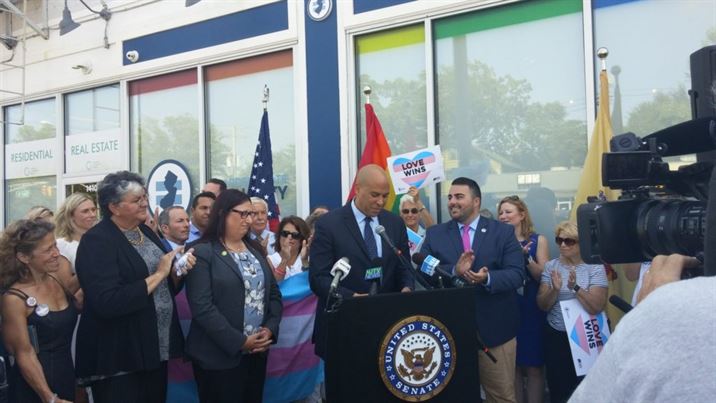(Newscast edited, directed and produced by Babee Garcia.)
On Wednesday July 26, 2017 at 8:55 a.m., President Trump sent shock waves across the nation when he tweeted, “The United States government will not accept or allow transgender individuals to serve in any capacity in the U.S. military. Our military must be focused on decisive and overwhelming victory and cannot be burdened with the tremendous medical costs and disruption that transgenders in the military would entail.”
As a former Marine who had been on active duty for three years, I was surprised at the president’s announcement via social media. It was unprofessional for our commander in chief to announce such a bold statement without informing the Department of Defense and discriminating against the LGBTQ veteran community. However, I did agree that the medical costs of upcoming transgender service members would affect mission readiness, just as much as other troops’ medical expenses like overcoming post-traumatic stress disorder, wounded warriors, prenatal needs for expected mothers, etc. I had other questions on my mind like how would transgender people be separated within squad bays in recruit training? What physical fitness training standards would they have to maintain? For those reasons, I fully agreed with President Trump’s ban.
After the president wrote his tweet, I decided to investigate further into the transgender military ban for answers over the next nine days. I did not want to become a “slanted journalist.” I wanted to understand all sides to this situation. I attended a rally in Asbury Park, New Jersey that was planned by the Garden State Equality organization. I witnessed Senator Cory Booker and Sgt. Maj Jennifer Long, a transgender Army veteran, speak to the community about this situation (see newscast above). I have spoken to Mr. Kenneth Key, a Montclair State veteran official and Capt. Thomas Sullivan, a Montclair State computer science graduate student with a B.A. in English.

Senator Cory Booker speaking six days after the rally in front of the Garden State Equality’s headquarters in Asbury Park, NJ. — By Babee Garcia, Entertainment Editor
Key and all protesters from the rally on July 29 were not in favor of the transgender military ban. Key said, “I thought it was bad because it is not fair to the transgender community. If they are allowed to do it in Europe, they should permit transgender people to serve here in the U.S.” Key has been working at Montclair State since 1980 and says there are about 300 Montclair State veteran students, both undergraduate and graduate. He keeps records of all Veteran Affairs records, including the Post 911 GI Bill used to pay a veteran student’s tuition.

The crowd at Asbury Park rally, which started at 11am and went on until 12pm. –By Babee Garcia, Entertainment Editor.
Capt. Sullivan, who served both in the New Jersey Army National Guard and as a military police officer for twelve years, expressed his views towards the ban:
“Twitter is not a program of record. It is not a law. I have noticed that people who had no service or background in [the military] were angry without truly understanding what it was or what it meant for anyone. According to the RAND’s report, a transgender transitioning in the military isn’t considered deployable because during the hormones treatment, they need routine lab work and bed rest post surgeries. It would be like going through the emotional highs and lows of puberty, plus dealing with the stresses of war. If we have a soldier who is non-deployable for 18 months, why have you in the military?”
After all the people that I have interviewed, the research I have read, and the data I collected, I realized that it is unjust and cruel for our president, with no military background, to target the transgender military community. No one should feel rejected when serving our country, as they possess tremendous courage and strength. They have earned the title, put in the work, and some even have risked their lives to defend our freedom. I would feel extremely offended if the military did not allow me to enlist because I am a woman. I do, however, believe that transgender reassignment surgery and hormonal treatments should not be one’s motive of enlisting in the military. Some people, prior to enlistment, join for the education benefits and medical care, not for the sake of making a difference within the country.
In my active duty service as a Marine and working alongside my husband Alfredo Garcia, who is also a Marine, we met so many friends in New River, NC. We all wore the same uniform, woke up at 5 a.m. to exercise and train for annual training requirements like rifle and swim qualifications.
My opinion towards the military ban is this: Transgender people in the military should be treated with as much dignity and respect as everyone else serving. As far as medical costs goes, I agree with President Trump. I do not think that the military should pay for transgender reassignment surgery and hormonal treatments because it is cosmetic, not mandatory. Wisdom teeth removal is an example of a surgery surgeons must perform before a service member goes on deployment.
Second, according to Walt Hayer from The Daily Signal article, “The military is a fighting force, not a gender clinic.” Sometimes, even with the sex change procedures, it does not solve the emotional and psychological problems within a transgender man or woman. Failed sex change surgeries can cost $3-4 billion at a 10-year cost.

Babee Garcia with SgtMaj Jennifer Long, a 30 year transgender Army veteran at the rally in Asbury Park, NJ. –By Alfredo Garcia Rodriguez.
My hope for the transgender military community during this time is to not let the president ruin their spirits or distract them from combat situations. Be physically and mentally fit for the tasks at hand. I extend my gratitude to them for fighting for the freedom of America and the right to express who they are.
As of July 27, 2017, General Joseph F Dunford Jr. told the NY Times, “The policy will not change until the White House sends the Defense Department new rules and the secretary of defense issues new guidelines.” There are still questions left unanswered and many are left outraged, not to mention afraid for what President Trump might say next.



